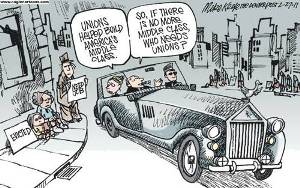
In the hours since Wednesday night’s thwarting of democracy in Madison, a repulsed nation has focused its attention on the immediate question: How the hell did this happen? How did a newly elected governor and legislative majority, flying in the face of heated opposition from most of the state’s residents, manage to circumvent the state’s constitution and enact a law with no purpose but to disempower the state’s public workforce? How did Wisconsin remake itself as Libya … or at least Arizona?
It’s an interesting question, to be sure, and the answers are full of strategizing and subterfuge and hubris. But the question of how Wisconsin’s Republicans took their state’s labor laws back to the 1920s is not the one we should be asking. What we should want to know is why they bothered. Why was Scott Walker’s first substantive act as governor a move that he had kept secret from his voting populace as he was campaigning to lead them? Why did he bother to strip collective-bargaining rights from a union that had already agreed to the wage and benefit givebacks he had demanded so he could pay for his tax breaks for the wealthy? The answers to those questions are complicated, and they have profound ramifications for the entire nation as we head into the decade.
Sometime over the last two years, one imagines, a group of wealthy white men sat down for a series of hush-hush meetings in a conference room somewhere — my guess is someplace like Karl Rove’s Washington office, or the Koch Brothers’ digs in Wichita — to plot out a way to make sure a political year like 2008 will never happen again. (Sure, this sounds like conspiracy theorizing — but how else can we explain how a dozen Republican governors got the same idea at the same time, and sprung it on horrified electorates who had no idea it was coming?)
Rove’s long-held and widely publicized dream of a Republican ”permanent majority” had been crushed, at least temporarily, by the party’s own incompetence, corruption and bad ideas. And in the wake of the Democrats’ ’08 sweep, as Washington Republicans flailed away but failed to stop the stimulus and health-care reform, the mainstream (and I use that word loosely) of conservatism suddenly seemed to have been co-opted by Tea Party populists who were almost as angry at the GOP establishment as they were at the guy in the White House whose race/religion/nationality (and maybe even policies) they couldn’t stomach.
 But while guys like Dick Armey were rousing the rabble, back in that conference room the brain trust of the Republican establishment began figuring out how to turn the Tea Party’s rage into a renewed power grab for themselves. They identified the sources of the Democratic Party’s new strength, and began devising ways to cut those sources off at the knees. First they focused on the remnants of organized labor, and particularly the public-employee unions, which could mobilize manpower and money to match the GOP’s own power base within the energy industry and the evangelical community. Then they noted the Democrats’ overwhelming majorities among minorities and young voters, both of whom had flocked to the polls in larger numbers than ever before to make history by electing Barack Obama.
But while guys like Dick Armey were rousing the rabble, back in that conference room the brain trust of the Republican establishment began figuring out how to turn the Tea Party’s rage into a renewed power grab for themselves. They identified the sources of the Democratic Party’s new strength, and began devising ways to cut those sources off at the knees. First they focused on the remnants of organized labor, and particularly the public-employee unions, which could mobilize manpower and money to match the GOP’s own power base within the energy industry and the evangelical community. Then they noted the Democrats’ overwhelming majorities among minorities and young voters, both of whom had flocked to the polls in larger numbers than ever before to make history by electing Barack Obama.
How could these three pillars of Democratic triumph be decimated, or at least held in check enough for Republicans to regain power? Well, Republicans were already expert at diminishing voter registration and turnout among African-American voters, via the wanton purging of voter rolls (see Florida, 2000) and other forms of intimidation and trickery (see Allen Raymond’s 2008 book How To Rig an Election: Confessions of a Republican Operative). Having already made considerable headway during the fall of ’08 toward de-legitimizing ACORN — the organization whose efforts to empower inner-city residents proved most offensive to conservatives because of its success in registering many thousands of black voters — destroying the group proved relatively simple in 2009. An overblown ”sting” operation here, a bit of Fox-ified outrage there, and public funding for ACORN was history.
The next move would have to wait until after the 2010 midterms, when the Tea Party’s trumped-up outrage and the customary, two-years-in reversion to the mean placed Republicans back in power in the House of Representatives as well as statehouses across the nation. On election night, pundits pondered the impact of new GOP dominance in the formerly industrial Midwest, where traditionally pro-union states needed to confront the reality that they could no longer afford the financial commitments they had conceded (in better times) to their unionized public employees. The unions confronted that reality themselves in the late autumn, and prepared to bargain their way to a deal that would balance their members’ livelihoods with the need to keep their states solvent.
 But the new governors of Wisconsin and Ohio, among other states, had a different idea — one that, as events have unfolded, can only have emerged from that conference room somewhere. Why stop at the demand for union concessions — a demand on which Gov. Walker did run for office last year — when they could use the current rash of state-budget crises (and the outrage of the Tea Partiers) as an excuse to demolish the public-employee unions entirely? Without the unions’ skills at organization to get hundreds of thousands of folks knocking on doors and turning out the vote … without their ability to translate members’ dues into millions of dollars in soft-money contributions and independent ad expenditures … the Democratic Party and its candidates could never keep up with the hundreds of millions sure to be spent each cycle by business interests and super-rich individuals in the wake of last year’s Supreme Court
But the new governors of Wisconsin and Ohio, among other states, had a different idea — one that, as events have unfolded, can only have emerged from that conference room somewhere. Why stop at the demand for union concessions — a demand on which Gov. Walker did run for office last year — when they could use the current rash of state-budget crises (and the outrage of the Tea Partiers) as an excuse to demolish the public-employee unions entirely? Without the unions’ skills at organization to get hundreds of thousands of folks knocking on doors and turning out the vote … without their ability to translate members’ dues into millions of dollars in soft-money contributions and independent ad expenditures … the Democratic Party and its candidates could never keep up with the hundreds of millions sure to be spent each cycle by business interests and super-rich individuals in the wake of last year’s Supreme Court travesty decision in the Citizens United case.
The way Walker and the state-senate Republicans finally pushed through Wednesday’s legislation — divorcing the union-busting provision from the rest of the employee-giveback bill, in order to get around rules that prohibit votes on money-spending issues without a quorum — exposed the move for what it always has been: an anti-democratic (not to mention anti-Democratic) power grab. It was not intended to save money or create efficiencies for the people or their government; it was intended purely to disembowel a crucial source of Democratic power, and to eliminate a key obstacle to Wisconsin becoming a one-party state.
 Whether their audacious move will succeed long-term in the courts, or with a disgusted state electorate, remains to be seen. But Walker’s efforts no doubt will be emulated in other red states, just as GOP statehouses are lining up measures that copy Arizona’s Show-Us-Your-Papers intimidation law. Meanwhile, get ready for the next plot to emerge from that Rove/Koch conference room: a concerted effort to stymie college-age voters and depress turnout among the young people who might re-elect President Obama in 2012.
Whether their audacious move will succeed long-term in the courts, or with a disgusted state electorate, remains to be seen. But Walker’s efforts no doubt will be emulated in other red states, just as GOP statehouses are lining up measures that copy Arizona’s Show-Us-Your-Papers intimidation law. Meanwhile, get ready for the next plot to emerge from that Rove/Koch conference room: a concerted effort to stymie college-age voters and depress turnout among the young people who might re-elect President Obama in 2012.
As the Washington Post reported a couple days ago, increasing numbers of elected Republicans have stopped hiding their disdain for those pesky young voters. The new GOP speaker of New Hampshire’s state House, for example, recently told a Tea Party meeting that ”foolish” college kids need to be stopped from voting because they’re ”voting as liberal[s]. That’s what kids do.” He also said they don’t have enough ”life experience” to be trusted at the polls, and ”they just vote their feelings.” His solution? A new law that would allow students at, say, Dartmouth to vote in Hanover only if they (or their parents) had established permanent residency there. All other students would have to vote in their hometowns. Another bill moving forward in New Hampshire would eliminate Election-Day registration, which makes it convenient for students to vote — because, as we all know, more voters means more fraud.
 Ah, yes, ”election fraud” — the conservative canard that imagined a nationwide New Black Panther movement that doesn’t actually exist … the one that routinely sends right-wing lawyers into inner-city polling places to mislead and intimidate black voters out of exercising their franchise … the one that contests as illegitimate any electoral result that doesn’t go the GOP’s way. Curbing supposed ”fraud” is the guiding principle behind the efforts in three dozen states to implement Voter ID rules that would mandate (but not sufficiently facilitate) the obtaining of an official identification card by those who don’t already possess a driver’s license. And who among the voting-age populace are statistically least likely to possess local driver’s licenses? Minorities and college kids, of course. Make voting more difficult (or, better yet, impossible) for them, and elections can be yours … if your primary appeal is to those whose political views encourage the denial of rights to others.
Ah, yes, ”election fraud” — the conservative canard that imagined a nationwide New Black Panther movement that doesn’t actually exist … the one that routinely sends right-wing lawyers into inner-city polling places to mislead and intimidate black voters out of exercising their franchise … the one that contests as illegitimate any electoral result that doesn’t go the GOP’s way. Curbing supposed ”fraud” is the guiding principle behind the efforts in three dozen states to implement Voter ID rules that would mandate (but not sufficiently facilitate) the obtaining of an official identification card by those who don’t already possess a driver’s license. And who among the voting-age populace are statistically least likely to possess local driver’s licenses? Minorities and college kids, of course. Make voting more difficult (or, better yet, impossible) for them, and elections can be yours … if your primary appeal is to those whose political views encourage the denial of rights to others.
The states in which these student-limiting and voter-ID battles are being fought most intensely are swing states — New Hampshire, North Carolina, Wisconsin (Wisconsin!) — where the demographic makeup of 2012’s electorate could swing the entire national election in one direction or the other. Republicans, by working so hard to destroy the Democrats’ power base and to stop various groups of people from voting, seem considerably more interested in their own power than in Americans’ basic rights or the other precepts of our democracy.
My guess is that there are a number of shoes left to drop in this new GOP gambit. Conservative vitriol toward immigrants has driven the vast majority of Hispanics into the Democratic column … which will require Republicans to dream up even more draconian measures than Arizona’s in order to keep them from turning a whole lot of states blue. Rep. Peter King’s vile crusade against the supposed extremism of American Muslims is likely to achieve the same effect, particularly in states like Michigan; how will Republicans try to put a lid on Muslim participation?
 One area in which we’re sure to see action over the next couple years is redistricting. Expect to see numerous Southern red states — and some of the newly red Midwest legislatures as well — imitate Texas’ outlandish, Tom Delay-instigated mapmaking of 2005, in hopes of limiting the number of Congressional seats available to Democrats. Expect a plethora of court challenges to those redrawings … and expect Republicans to steer those challenges toward district courts where judges who share their ideology are liable to put politics before law, the same way judges in Virginia and Florida have done in striking down elements of the Affordable Care Act.
One area in which we’re sure to see action over the next couple years is redistricting. Expect to see numerous Southern red states — and some of the newly red Midwest legislatures as well — imitate Texas’ outlandish, Tom Delay-instigated mapmaking of 2005, in hopes of limiting the number of Congressional seats available to Democrats. Expect a plethora of court challenges to those redrawings … and expect Republicans to steer those challenges toward district courts where judges who share their ideology are liable to put politics before law, the same way judges in Virginia and Florida have done in striking down elements of the Affordable Care Act.
After all, that’s the Republican strategy for the 21st century. When your policies have proven immoral and inept; when your method of governance has proven incompetent; when your leaders have proven corrupt — that’s the time to circumvent the will of the people by any means necessary. The election of 2008 stopped conservatives just short of their goal of transferring the nation’s wealth and power into the hands of the very few; now it seems they’ll have to pull out all the democracy-thwarting stops in order to get the rest of the way there.




Comments